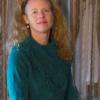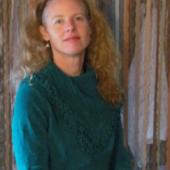Editor’s note: The local performance company Off-Leash Area has a reputation for the amount of research they put into a project. I can attest to this, having worked with them on a few projects that were research-intensive, including a play about a local murder that involved extensive discussions with local organizations that address the needs of at-risk teens and young adults. The company’s work is deeply informed by the research they do, and so I asked company cofounder Jennifer Ilse to discuss how they research a play, and how it affects the end result.
Off-Leash has a new production coming out in April called “Now Eye See You, Now Eye Don't,” which has as its starting point surgeries that Off-Leash cofounder Paul Herwig has had on his eyes, and uses this as a jumping off point to examine the world of vision, and art, and health care.
Research for this show has included traveling to the observatories atop Mauna Kea in Hawaii, at the Art Basel contemporary art fair in Miami Beach, and the Whitney Biennial in New York. They partnered with Phillips Eye Institute, observing surgeries and talking to doctors, and with Vision Loss Resources, where they met with focus groups of people who have lost their sight. They have also worked with Blind Inc., where Herwig is currently taking cane-walking classes to perfect his onstage character.
How a show is researched
The initial impetus for this play was a result of Paul's last big surgery for a torn retina. They put a gas bubble in your eye to hold the retina in place as it heals, and the bubble slowly dissolves over a couple weeks. The totally tripped-out images from this, coupled with his lifelong fear of going blind and dealing with the health care industry as an uninsured person, inspired Paul to create a show about perception: How we perceive the world visually; how blind people perceive the world and are perceived by the world; how the healthcare industry perceives its consumers; and how the consumers view the healthcare industry. This further brought him to think of himself as a visual artist, and the art industry in all its capitalistic glory, and also consider this idea of perception between those who control the art world and the artists.
So our research was to look at these questions. We've talked with lots of people with significant vision loss, we've talked with doctors and hospital administrators, experienced giant Mall of America-style art fairs, and dug into the science of vision both from a medical viewpoint and an astronomical viewpoint of how information is received from space (the instruments are so
similar to the eye).
Evidentally, a lot of religious people feel they need to pray over or somehow attempt to "heal" blind people. My favorite story by one of the people we met was when he was walking by a church, a youth group outside surrounded him and prayed over him. Overall, the list of stuff we've learned about the experience of being blind, the medical world, the higher echelons of the world of art, is enormous.
Our research is not only to learn a bunch of details, but we pursue it deeply so that we feel we have a visceral understanding of the subjects as well as an intellectual understanding. Because of this, not only do we have plenty of details that will be true to the world -- terminology, props, specific relationships, etc. -- but the nuances of how a character exists on stage are just as important to us. It's integrated into the choreography of the surgical team (the surgical team is portrayed by modern dancers), it's part of Paul's way of moving and being as his character loses his vision.
The importance of research
I've seen shows where a subject felt like someone had a read a book and thought they knew everything about that subject, but a book is just one person's perspective. And it's just a book. To really understand something in order to give it life on a stage, I think you need to tackle it from every angle of how it will be portrayed. The experience of live performance can be visual, aural, emotional, intellectual, visceral, (did I miss anything?) You have to experience it and talk to people, see and experience stuff to whatever extent is possible, not just read about it, if you're interested in really bringing a full experience to the audience about that subject.
One of the past shows we also did a particularly large amount of research on was "Maggie's Brain," a show about the effect of schizophrenia and the individual. We talked to people who have schizophrenia, their families, organizations who deal with the issue, and psychiatrists. These people also directed us to resources for reading material and videos. We also shared a lot of this with the cast so they could dig into the development of their own characters. I think the result was a really deep theatrical event of the experience of mental illness -- both with the individual and with their relationships with family and medical practitioners.
The thing that has been by far the most helpful is finding the right organizations and/or individuals to connect with that deal with the subject matter. If you find people excited about the subject, who spend their lives in it, not only will they help you answer some questions, but they can connect you to a whole network of people and resources that can help you go deep and also challenge your own preconceived ideas.





